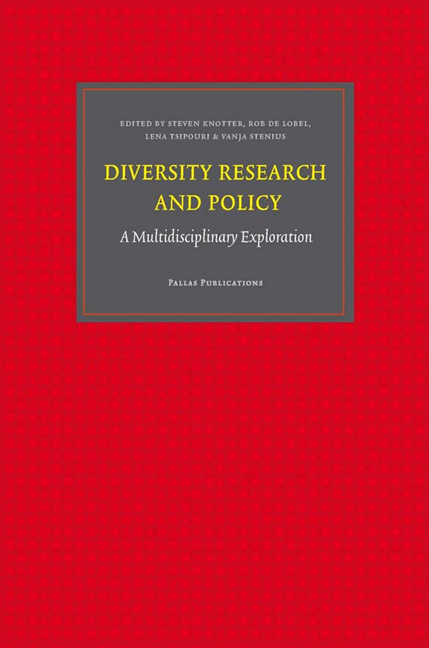Book contents
- Frontmatter
- Contents
- Acknowledgements
- 1 An Introduction
- 2 Diversity and Social Anthropology
- 3 Diversity and Sociology
- 4 Diversity and Criminology
- 5 Diversity and Ecology/Ecological Economics
- 6 Linguistic Diversity
- 7 Diversity and Architecture
- 8 Diversity and Urban Planning
- 9 Diversity and Economics
- 10 Diversity and Diversity Management in Business and Organisation Studies
- 11 Diversity and (Organisational) Psychology
- 12 Diversity and Law
- 13 Diversity and Public Policy
- 14 Conclusion
- About the Authors
- About the Reviewers
3 - Diversity and Sociology
Published online by Cambridge University Press: 15 January 2021
- Frontmatter
- Contents
- Acknowledgements
- 1 An Introduction
- 2 Diversity and Social Anthropology
- 3 Diversity and Sociology
- 4 Diversity and Criminology
- 5 Diversity and Ecology/Ecological Economics
- 6 Linguistic Diversity
- 7 Diversity and Architecture
- 8 Diversity and Urban Planning
- 9 Diversity and Economics
- 10 Diversity and Diversity Management in Business and Organisation Studies
- 11 Diversity and (Organisational) Psychology
- 12 Diversity and Law
- 13 Diversity and Public Policy
- 14 Conclusion
- About the Authors
- About the Reviewers
Summary
A Brief Description of the Discipline of Sociology
The birth of the discipline of sociology took place along with society's efforts to respond to changes in advanced Western modernity. Following the industrial revolution and the major changes that have influenced human history, sociology presented itself as a discipline that seeks to identify the elements that allow for a reading of these major events. Sociology, then, is a response to changing societal conditions. One can affirm that the changes within advanced “modern” society and individuals’ subsequent responses to these changes represent the object of study in sociology. Sociological research today, which is based on the macro theories that we have come to know in recent history (e.g., functionalism, structuralism, conflict theory), reflects the intellectual culture of western Europe in the 1800s. Sociological research today does not make originality a prerogative, but rather influences future developments that will in turn impact sociological thinking.
The technological changes that took place in England in the second half of the 1700s and the subsequent birth of major urban centres represent the elements of interest for the first sociologists and the prevailing focus of research. The positivistic studies by Auguste Comte and Émile Durkheim reflect the bourgeois post-revolution French situation, while Karl Marx's studies stem from the birth of classes within society and Max Weber's socio-historical reading is an expression of capitalistic modernity. Sociology, then, is a response to the difficulties encountered in managing a situation that was markedly “diverse” in respect to the past and that European society found itself having to confront during a particular moment within “modern” history. The social change that followed the industrial revolution imposed a social order that led sociological thought to have to confront itself with that which is considered different from the past, mutable, in transformation.
The Meaning and Categorisation of Diversity in Sociology
Sociological research focuses on the individual in society and the totality of meanings that describe social relations. Within this framework, “diversity”, as a subject of study, becomes a fundamental element since it defines the variability in human action. It is from this premise that we can depart in order to focus on “sociology of diversity”. Diversity is a concept that, in and of itself, assumes multiple meanings that then become part of common usage from the moment in which they enter within the realm of “socio-economic ends” or become “useful” as assertion strategies.
- Type
- Chapter
- Information
- Diversity Research and PolicyA Multidisciplinary Exploration, pp. 43 - 56Publisher: Amsterdam University PressPrint publication year: 2012

